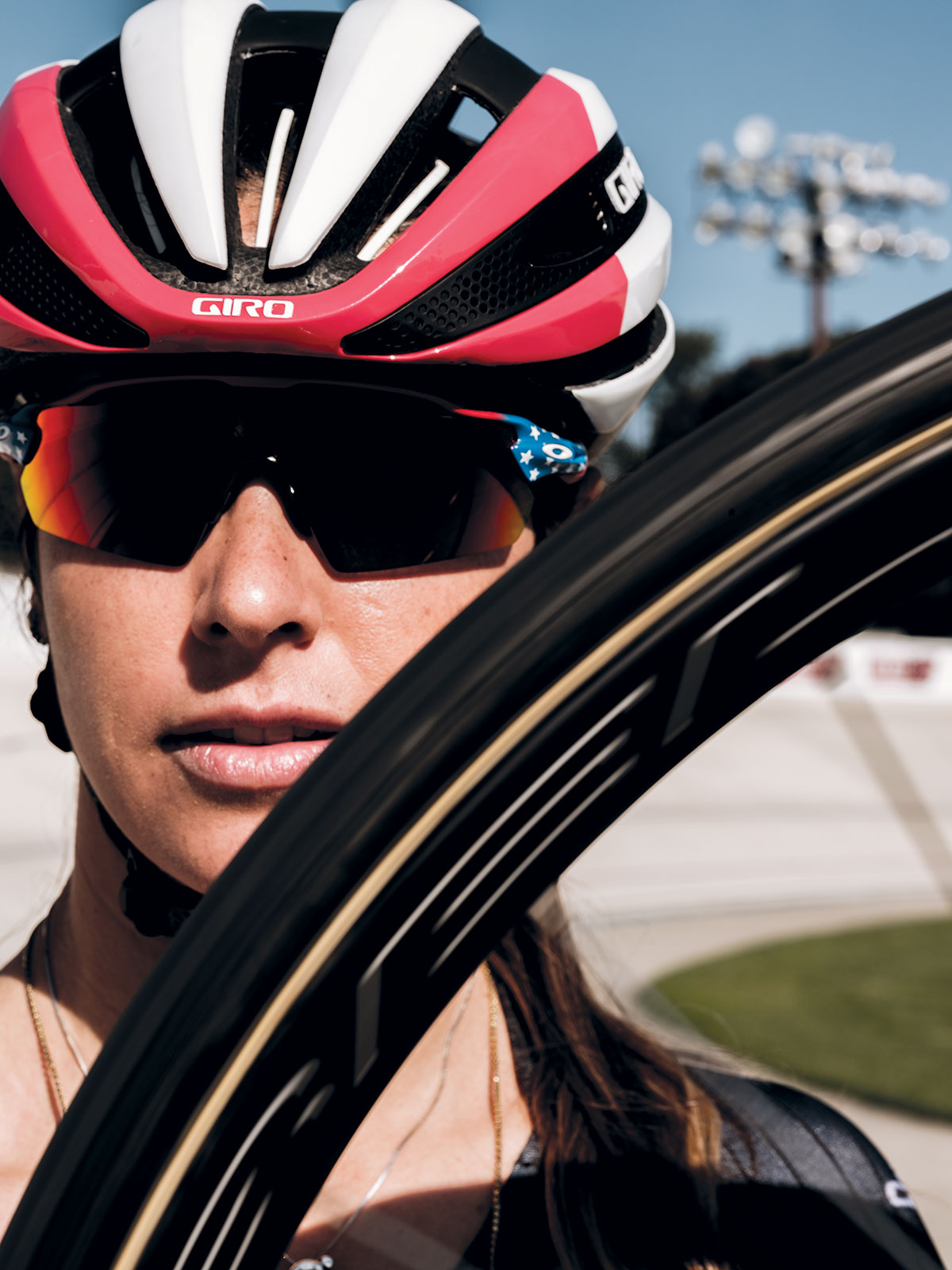
Idleness has never come easy for professional cyclist Mandy Marquardt. Like so many others across the globe, she's had to adapt to a new normal that was necessitated by the relentless onslaught of the coronavirus pandemic. In her case, that's meant more time hunkered down on her bike at home in Upper Macungie, and less time traveling from one elite competition to the next. “It's the first time I've been home in six years,” she says. With top-tier races on hold indefinitely, she's keeping her focus on training as vigorously as she can under social distancing conditions.
Of course, Marquardt, a track sprint cyclist who's an 18-time U.S. National Champion, a three-time American record holder and an Olympic hopeful for the (now 2021) Tokyo Games, has dealt with speed bumps before—and not just in the literal sense. She was 16 years old when she received an unexpected and life-altering diagnosis while undergoing routine testing and bloodwork. “The tests showed I had elevated blood sugar levels,” she explains. Marquardt can still recall her initial reaction upon being told she had type 1 diabetes: “How do I have diabetes? I'm an athlete.” That was followed by a mix of frustration and uncertainty about what would come next. “I met a doctor who told me I'd never be able to compete in a high level in my sport,” she says. “I thought it was the end for me.”
By that time, Marquardt was already several years into a promising cycling career. Born in Mannheim, Germany, in 1991, Marquardt moved with her mother and father to Plantation, Florida, when she was six years old. Her parents were both athletic and encouraged Marquardt to be active. Early on, she tried swimming and tennis—she even toyed with the idea of seeking out a professional career in the latter. Cycling was nothing more than a minor blip on her radar until she decided she wanted to up her pedaling prowess to compete in a triathlon around the age of 11. Suddenly, the young athlete had found a new niche. “I kind of left everything else behind,” she says.
Luckily, she wouldn't have to travel far to hone her craft; the Brian Piccolo Park Velodrome was near her family's home in Florida, and it was there that training for Marquardt's competitive career began. In 2003, she competed at the U.S. Junior Women's 10–12 Road National Championships and took home two gold medals (criterium and time trial) and a silver (road race). Four years later, Marquardt moved back to Germany to live with her father. She continued to compete in endurance road and track cycling events.
It was while she was living in Germany that she was told she had type 1 diabetes; post-diagnosis, Marquardt had to rethink her entire routine, both off and on her bike. “It was so tough. I would go through denial periods,” she says. “It makes you grow up quickly.”
Type 1 diabetes is a condition in which the pancreas produces little or no insulin, which is a hormone needed to help blood sugar enter the body's cells, where it can be used for energy. Without insulin, blood sugar can't get into those cells and instead builds up in the bloodstream. According to the Centers for Disease Control and Prevention, type 1 diabetes is much less common than type 2; about 5–10 percent of people with diabetes have type 1. It's a chronic condition, and there's no cure. “It was a lot of trial and error,” says Marquardt, of her initial struggle to balance her new medical needs with a demanding training schedule. And that's because, she explains, it's not just about what you eat and drink. So many outside factors can impact blood sugar levels, such as physical exertion, time zone changes and sleep schedules; all things a busy, on-the-go athlete must contend with on a regular basis.
Marquardt credits her doctors and her parents with helping to get her through some of the rough patches. And she had the benefit of adding another support system in 2010, when she found her tribe in the cycling world: Team Novo Nordisk is the first professional cycling team made up entirely of riders living with type 1 diabetes. “It was incredible when I first met them,” says Marquardt. “It was like, ‘Oh my God, I'm not alone. There are so many other people.'” The team aims to educate and inspire others living with type 1 diabetes, which is a cause that resonates deeply with Marquardt. “It's definitely possible to live a normal life,” she says. “You just have to manage the condition.”

The Lehigh Valley chapter of Marquardt's life began in earnest in 2010, when she enrolled at Penn State Lehigh Valley. Marquardt had spent time in the region previously for competitions at the Valley Preferred Cycling Center in Trexlertown. She says she always found it appealing; parts of it reminded her of Germany. She raced collegiately for Penn State Lehigh Valley and began working with coach Andrew Harris of Edge Cycling, who helped her arrive at the decision to make the transition from endurance to sprint cycling. “I made the switch because my endurance career wasn't excelling and I always preferred shorter events,” she says. “After some testing, Coach Andrew identified that my strength and capabilities were better suited for sprint.”
Marquardt says after graduating from Penn State in 2014, the decision to stick around the Lehigh Valley was an easy one. “Why am I going to leave? I have a coach; I have a team.” She also had a special someone in her life: her now-fiancé, Jamie Alvord, a former pro cyclist himself who still rides recreationally and helps Marquardt train, and training is something she does a lot of, pandemic or not. “It's pretty much year-round,” she says. She's at it six days a week, for up to 35 hours, and then there are recovery/maintenance must-haves like massages, physical therapy, sports psychology and chiropractor visits that also must be made a priority. “Everything I do revolves around my sport. It's hard to do anything else,” Marquardt says. But the nose-to-the-grindstone approach is paying off—beyond her achievements on the track, she's snagged sponsorships with Factory in Bethlehem, Texas-based Mammoth Creameries (a keto-friendly ice cream brand co-founded by a man with type 1 diabetes) and nutritional supplement company Klean Athlete, just to name a few.
She does still find time, though, to share her inspiring story of perseverance with others. In June of 2020, it was announced that Marquardt was partnering with St. Luke's University Health Network to help promote diabetes awareness, women's sport and a healthy, active fit lifestyle. As a St. Luke's Sports Ambassador, she has a voice in the local diabetes community, and she intends to use it. “I think it's important to be that example and show them that it's nothing to be ashamed about,” she says. “Keep following your passion. Find what motivates you, what drives you.” And then she borrows a line from Team Novo Nordisk CEO and co-founder Phil Southerland: “Diabetes only chooses the champions.”















